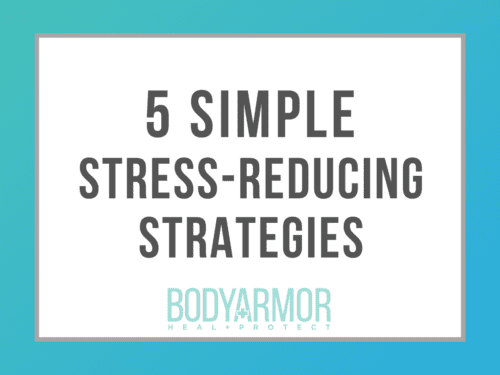
It’s safe to say: we all experience stress from time to time. These pressures can come from work, personal life, finances, and everything in between. But when stress becomes excessive, it’s not just our mind that feels the effects…
In fact, prolonged or chronic stress takes a significant toll on just about every part of the body. When stress signals are continually firing, there are less energy and resources available for fighting off infections, stabilizing mood, or repairing damage.
The good news is: there are easy and effective ways to combat the stress in our lives! Practice these stress-reducing strategies to support healing and help restore balance to the body.
Exercise
Engaging in regular exercise is one of the fastest and most beneficial ways to combat stress.
Exercise activities stimulate blood flow, enhance cognitive function, activate the parasympathetic nervous system, and even stimulate the production of endorphins (“feel-good” chemicals).

To get even more benefit, include some outdoor activities in your routine-such as hiking, bike riding or just taking a walk. Research has shown that being in nature is both mood-boosting and stress reducing.
Sleep
According to the CDC, adults should get at least 7-8 hours of sleep every night, but many adults report falling short of this recommendation.
We’ve all experienced the consequences of a poor night of sleep…sluggishness, irritability, and even poor concentration. But sleep plays an important role in more than just our mood.

Getting poor quality or too little sleep on a regular basis causes increased inflammation and stress in the body. These changes are associated with a higher risk of developing chronic issues like heart disease, diabetes, and even cancer.
The restorative processes that take place during sleep-including the regulation of stress hormones-are essential to keep all the systems functioning smoothly.
How can you commit to giving your body the rest it needs? Try coming up with a nightly routine, keeping a consistent sleep schedule, and ensuring your environment is quiet, dark, and relaxing.
Feed your body good “fuel”
When it comes to keeping stress levels under control, good nutrition is not just helpful-it’s essential! Many processed foods contain added salt, refined sugars, and unhealthy fats that disrupt stress hormones.
Instead, try to incorporate more healthy fats, leafy vegetables, and antioxidant-rich foods. These dietary choices help support the immune system and the hormones needed to mediate the stress response.
Practice mindfulness
Regularly engaging in mindfulness practices has been found to decrease stress and even strengthen the immune system. A few examples of mindfulness activities include quiet meditation, yoga, and breathing exercises.

Activities like these also improve stress levels by helping the mind calm down from any racing thoughts. In addition to calming the mind, mindfulness helps the body achieve an optimal state to address any stressors that may arise.
Limit caffeine
Most of us know the power of our morning cup of coffee to get us going…
But after the short-term boost of energy and alertness, consuming too much caffeine can have troubling effects on stress in the body.
Research has shown that caffeine causes unnatural spikes in cortisol, one of the major hormones involved in the stress response. Caffeine can also affect the amount and the quality of your sleep, even several days after consumption.
So, what can you do about it? Moderation is the key: try to limit your coffee intake to a cup or two a day, ideally during the morning hours. And if you find yourself missing the afternoon beverage, try swapping for an herbal tea (like chamomile) for added calming effects.







